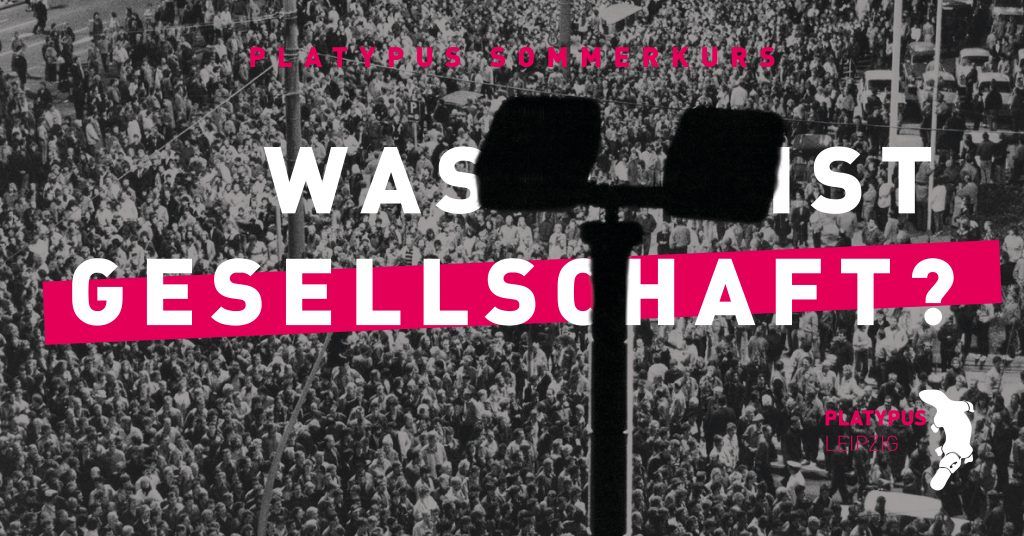Die umstrittenste Annahme des Marxismus ist die Diktatur des Proletariats. Und in der Tat bildet sie das, wodurch sich der Marxismus politisch, ideologisch und theoretisch, intellektuell, praktisch und organisatorisch auszeichnet. Der Tod der Linken misst sich an der Abkehr von dieser These.
"Society is a reality sui generis; it has its own characteristics that are either not found in the rest of the universe or are not found there in the same form."
— Emile Durkheim
"Society is a sui generis being with its own special nature, distinct from that of its members, and a personality of its own different from individual personalities."

Zeit: Donnerstags, 18:30 bis 21:30 Uhr
Ort: PEG -Gebäude Raum 1.G131, Campus Westend
Kontakt: platypus.frankfurt@gmail.com
Die Texte werden im Voraus gelesen und dann zusammen diskutiert. Alle sind herzlich willkommen!
● vorausgesetzte Texte
+ zusätzliche, empfohlene Texte
Vorausgesetzte Hintergrundlektüre:
• Chris Cutrone, "Back to Herbert Spencer! Industrial vs. militant society" (2016) [audio]
Empfohlene, zusätzliche Hintergrundtexte:
+ Adorno, "Static and Dynamic as Sociological Categories" (1961)
+ Adorno, Introduction to Sociology 1962 lectures
+ Adorno, Philosophical Elements of a Theory of Society 1964 lectures
+ Adorno, Philosophy and Sociology 1960 lectures
Einleitende Texte:
• Adorno, “Gesellschaft” (1965; in: Adorno, Soziologische Schriften I; wird auf Anfrage per Email verschickt)
• Benjamin Constant: „Von der Freiheit des Altertums, verglichen mit der Freiheit der Gegenwart”(1819)
Schaubilder und Begriffe:
+ Capital in history timeline and chart of terms
+ Being and becoming (freedom in transformation) / immanent dialectical critique chart of terms
+ Capitalist contradiction chart of terms
+ Commodity form chart of terms
+ Reification chart of terms
1. Woche: 01.09.22
• Adorno, “Gesellschaft” (1965; in Adorno, Soziologische Schriften I)
+ Chris Cutrone, "Gillian Rose's 'Hegelian' critique of Marxism" (2010)
• Gillian Rose, Hegel Contra Sociology (1981/95) selections: Preface for 1995 reprint, 1. The Antinomies of Sociological Reason, 7. With What Must the Science End?
2. Woche: 08.09.22
• Epigraphe über moderne Geschichte und Freiheit von Louis Menand (über Marx und Engels), und Karl Marx, über das „Werden“ (Aus den Grundrissen, 1857-58)
• Max Weber, Die protestantische Ethik und der Geist des Kapitalismus (1904-1905) Auswahl: Vorbemerkung, Teil 1, I. Kapitel 1-3, Teil 1., II. (+ Kapitel 1,) Kapitel 2 [wird per Email verschickt, bitte anfragen]
3. Woche: 15.09.22
• Auguste Comte, Introduction to Positive Philosophy (1830-42) I. The nature and importance of the positive philosophy; The Positive Philosophy of Auguste Comte vol. III Bk. VI. Social Physics pp. 1-11, 199-216, 277-344 [PDF Positive Philosophy of Comte selections]; A General View of PositivismCh. II. The Social Aspect of Positivism pp. 63-78, Ch. VI. The Religion of Humanity pp. 340-426 [PDF General View of Positivism selections]
+ Chris Cutrone, "Ends of philosophy" (2018)
4. Woche: 22.09.22
+ Chris Cutrone, "Back to Herbert Spencer! Industrial vs. militant society" (2016) [audio]
• Herbert Spencer, Principles of Sociology Vol. I Part I The Data of Sociology Ch. I-IV pp. 3-40 [PDF] and Part II The Inductions of Sociology Ch. I-II pp. 447-462 [PDF]; On Social Evolution (Univ. Chicago selections): IV 15–16 Societal Typologies, Militancy and Industrialism and V 18–19 Ceremonial and Political Institutions; The Man Versus the State VI The Great Political Superstition [PDF selection]
5. Woche: 29.09.22
• Emile Durkheim, "The principles of 1789 and sociology" (1890); V Social Creativity Ch. 11-12; alles in On Morality and Society
• Emile Durkheim (1912): Die elementaren Formen des religiösen Lebens, Einleitung
6. Woche: 06.10.22
• Durkheim, Chapter 10. "The dualism of human nature and its social conditions" (1914), Ch. 4. "Individualism and the intellectuals" (1898); IV The Evolution of Morality Ch. 6, in On Morality and Society
• Durkheim: Über soziale Arbeitsteilung (1893) Vorwort zur ersten Ausgabe und Einleitung
7. Woche: 13.10.22
• Durkheim, The Division of Labor in Society (1893) selections IV. The Evolution of Morality Chapters 7-9, in On Morality and Society;
• Durkheim: Über soziale Arbeitsteilung, Vorwort zur zweiten Ausgabe
8. Woche: 20.10.22
• Frankfurt School, Aspects of Sociology (1956) selections: Preface by Horkheimer and Adorno, Chapters I-VI, XII
• Adorno: “Gesellschaft” (1965)
+ Adorno, "Static and Dynamic as Sociological Categories" (1961)
Lesekreis zu Klassischer Soziologie

Die Texte werden im Voraus gelesen und dann zusammen diskutiert. Alle sind herzlich willkommen!
Zeit: Mittwochs 19 - 22 Uhr [in Woche 4 am Dienstag!]
Ort: Liebknecht-Haus, Braustraße 15, 04107 Leipzig
● vorausgesetzte Texte
+ zusätzliche, empfohlene Texte
Vorausgesetzte Hintergrundlektüre:
• Chris Cutrone, "Back to Herbert Spencer! Industrial vs. militant society" (2016) [audio]
Empfohlene, zusätzliche Hintergrundtexte:
+ Adorno, "Static and Dynamic as Sociological Categories" (1961)
+ Adorno, Introduction to Sociology 1962 lectures
+ Adorno, Philosophical Elements of a Theory of Society 1964 lectures
+ Adorno, Philosophy and Sociology 1960 lectures
Einleitende Texte:
• Adorno, “Gesellschaft” (1965; in: Adorno, Soziologische Schriften I; gesamtes Buch kann auf Anfrage per Email verschickt werden)
• Benjamin Constant: „Von der Freiheit des Altertums, verglichen mit der Freiheit der Gegenwart”(1819)
Schaubilder und Begriffe:
+ Capital in history timeline and chart of terms
+ Being and becoming (freedom in transformation) / immanent dialectical critique chart of terms
+ Capitalist contradiction chart of terms
+ Commodity form chart of terms
+ Reification chart of terms
Woche 1: 17. August 2022
• Adorno, “Gesellschaft” (1965; in Adorno, Soziologische Schriften I)
+ Chris Cutrone, "Gillian Rose's 'Hegelian' critique of Marxism" (2010)
• Gillian Rose, Hegel Contra Sociology (1981/95) Auswahl: Preface for 1995 reprint, 1. The Antinomies of Sociological Reason, 7. With What Must the Science End?
Woche 2: 24. August 2022
• Epigraphe über moderne Geschichte und Freiheit von Louis Menand (über Marx und Engels), und Karl Marx, über das „Werden“ (Aus den Grundrissen, 1857-58)
• Max Weber, Die protestantische Ethik und der Geist des Kapitalismus (1904-1905) Auswahl: Vorbemerkung, I. Teil Kapitel 1-3, II. Teil Kapitel 2 (+ Kapitel 1) [wird per Email verschickt, bitte anfragen]
Woche 3: 31. August 2022
• Auguste Comte, Introduction to Positive Philosophy (1830-42) I. The nature and importance of the positive philosophy
• Comte, The Positive Philosophy of Auguste Comte vol. III Auswahl: Bk. VI. Social Physics pp. 1-11, 199-216, 277-344 [PDF Positive Philosophy of Comte Auswahl]
• Comte, A General View of Positivism Auswahl: Ch. II. The Social Aspect of Positivism pp. 63-78, Ch. VI. The Religion of Humanity pp. 340-426 [PDF General View of Positivism Auswahl]
+ Chris Cutrone, "Ends of philosophy" (2018)
Woche 4: 06. September 2022
+ Chris Cutrone, "Back to Herbert Spencer! Industrial vs. militant society" (2016) [audio]
• Herbert Spencer, Principles of Sociology Vol. I Auswahl: Part I The Data of Sociology Ch. I-IV pp. 3-40 [als PDF] und Part II The Inductions of Sociology Ch. I-II pp. 447-462 [als PDF]
• Spencer, On Social Evolution: Selected Writings Auswahl: IV 15–16 Societal Typologies, Militancy and Industrialism und V 18–19 Ceremonial and Political Institutions
• Spencer, The Man Versus the State Auswahl: VI The Great Political Superstition [als PDF]
Woche 5: 14. September 2022
• Emile Durkheim, "The principles of 1789 and sociology" (1890); V Social Creativity Ch. 11-12; alles in On Morality and Society
• Durkheim, Die elementaren Formen des religiösen Lebens (1912), Einleitung
Woche 6: 21. September 2022
• Durkheim, Chapter 10. "The dualism of human nature and its social conditions" (1914), Ch. 4. "Individualism and the intellectuals" (1898); III. The Evolution of Morality Ch. 6, in On Morality and Society
• Durkheim, Über soziale Arbeitsteilung (1893) Auswahl: Vorwort zur ersten Ausgabe [gesamte PDF auf englisch] und Einführung
Woche 7: 28. September 2022
• Durkheim, III. The Evolution of Morality Chapters 7-9, in On Morality and Society
• Durkheim, Über soziale Arbeitsteilung, Vorwort zur zweiten Ausgabe
Woche 8: 05. Oktober 2022
• Frankfurter Schule, Aspects of Sociology (1956) Auswahl: Preface by Horkheimer and Adorno, Chapters I-VI, XII [deutsche Version wird auf Anfrage zugeschickt]
• Adorno, "Gesellschaft" (1965)
+ Adorno, "Static and Dynamic as Sociological Categories" (1961) [deutsche Version wird auf Anfrage zugeschickt]

“Society is a reality sui generis; it has its own characteristics that are either not found in the rest of the universe or are not found there in the same form."
"Society is a sui generis being with its own special nature, distinct from that of its members, and a personality of its own different from individual personalities."
- Emile Durkheim
Die Texte werden im Voraus gelesen und dann zusammen diskutiert. Neueinsteiger:innen sind herzlich willkommen und es werden keine Vorkenntnisse benötigt
Zeit: Sonntags 19:30-22:30
Ort: Online via Zoom; Zoom-Meeting: https://us02web.zoom.us/j/87686873649
• vorausgesetzte Texte
+ zusätzlich, empfohlene Texte
Vorausgesetzte Hintergrundlektüre:
• Chris Cutrone, "Back to Herbert Spencer! Industrial vs. militant society" (2016) [audio]
Empfohlene, zusätzliche Hintergrundtexte:
+ Adorno, "Static and Dynamic as Sociological Categories" (1961)
+ Adorno, Introduction to Sociology (1962 lectures)
+ Adorno, Philosophical Elements of a Theory of Society (1964 lectures)
+ Adorno, Philosophy and Sociology (1960 lectures)
Einleitende Texte:
• Adorno, “Gesellschaft” (1965; in: Adorno, Soziologische Schriften I; wird auf Anfrage per Email verschickt)
• Benjamin Constant: „Von der Freiheit des Altertums, verglichen mit der Freiheit der Gegenwart”(1819)
Schaubilder und Begriffe:
+ Capital in history timeline and chart of terms
+ Being and becoming (freedom in transformation) / immanent dialectical critique chart of terms
+ Capitalist contradiction chart of terms
+ Commodity form chart of terms
+ Reification chart of terms
1. Woche: 21. August 2022
• Adorno, “Gesellschaft” (1965; in Adorno, Soziologische Schriften I)
+ Chris Cutrone, "Gillian Rose's 'Hegelian' critique of Marxism" (2010)
• Gillian Rose, Hegel Contra Sociology (1981/95) selections: Preface for 1995 reprint, 1. The Antinomies of Sociological Reason, 7. With What Must the Science End?
2. Woche: 28. August 2022
• Epigraphe über moderne Geschichte und Freiheit von Louis Menand (über Marx und Engels), und Karl Marx, über das „Werden“ (Aus den Grundrissen, 1857-58)
• Max Weber, Die protestantische Ethik und der Geist des Kapitalismus (1904-1905) Auswahl: Vorbemerkung, Teil 1, I. Kapitel 1-3, Teil 1., II. (+ Kapitel 1,) Kapitel 2 [wird per Email verschickt, bitte anfragen]
3. Woche: 4. September 2022
• Auguste Comte, Introduction to Positive Philosophy (1830-42) I. The nature and importance of the positive philosophy; The Positive Philosophy of Auguste Comte vol. III Bk. VI. Social Physics pp. 1-11, 199-216, 277-344 [PDF Positive Philosophy of Comte selections]; A General View of PositivismCh. II. The Social Aspect of Positivism pp. 63-78, Ch. VI. The Religion of Humanity pp. 340-426 [PDF General View of Positivism selections]
+ Chris Cutrone, "Ends of philosophy" (2018)
4. Woche: 11. September 2022
+ Chris Cutrone, "Back to Herbert Spencer! Industrial vs. militant society" (2016) [audio]
• Herbert Spencer, Principles of Sociology Vol. I Part I The Data of Sociology Ch. I-IV pp. 3-40 [PDF] and Part II The Inductions of Sociology Ch. I-II pp. 447-462 [PDF]; On Social Evolution (Univ. Chicago selections): IV 15–16 Societal Typologies, Militancy and Industrialism and V 18–19 Ceremonial and Political Institutions; The Man Versus the State VI The Great Political Superstition [PDF selection]
5. Woche: 18. September 2022
• Emile Durkheim, "The principles of 1789 and sociology" (1890); V Social Creativity Ch. 11-12; alles in On Morality and Society
• Emile Durkheim (1912): Die elementaren Formen des religiösen Lebens, Einleitung
6. Woche: 25. September 2022
• Durkheim, Chapter 10. "The dualism of human nature and its social conditions" (1914), Ch. 4. "Individualism and the intellectuals" (1898); IV The Evolution of Morality Ch. 6, in On Morality and Society
• Durkheim: Über soziale Arbeitsteilung (1893) Vorwort zur ersten Ausgabe und Einleitung
7. Woche: 2. Oktober 2022
• Durkheim, The Division of Labor in Society (1893) selections IV. The Evolution of Morality Chapters 7-9, in On Morality and Society;
• Durkheim: Über soziale Arbeitsteilung, Vorwort zur zweiten Auflage
8. Woche: 9. Oktober 2022
• Frankfurt School, Aspects of Sociology (1956) selections: Preface by Horkheimer and Adorno, Chapters I-VI, XII
• Adorno: “Gesellschaft” (1965)
+ Adorno, "Static and Dynamic as Sociological Categories" (1961)
Platypus Sommerkurs: Was ist Gesellschaft?
Zeit: vom 18.8.-6.10.2022 immer Donnerstag 19Uhr
Ort: Laika Neukölln, Emser Straße 131, 12051 Berlin

